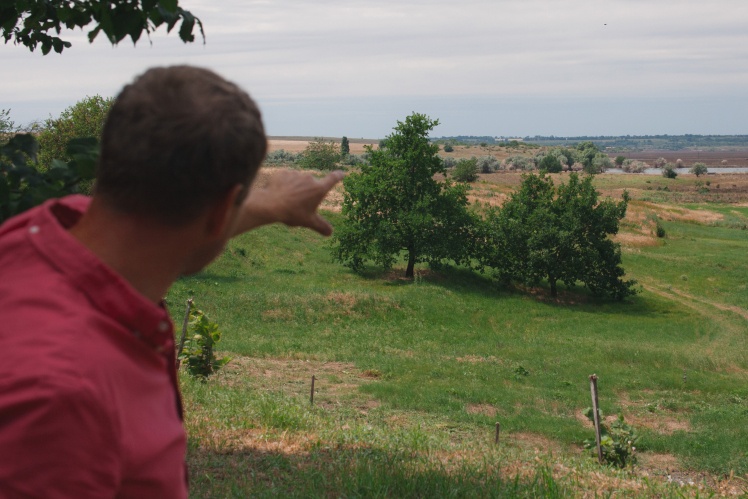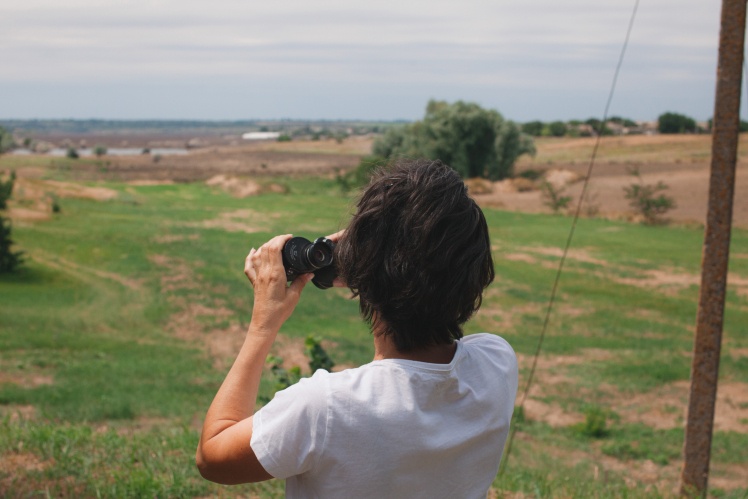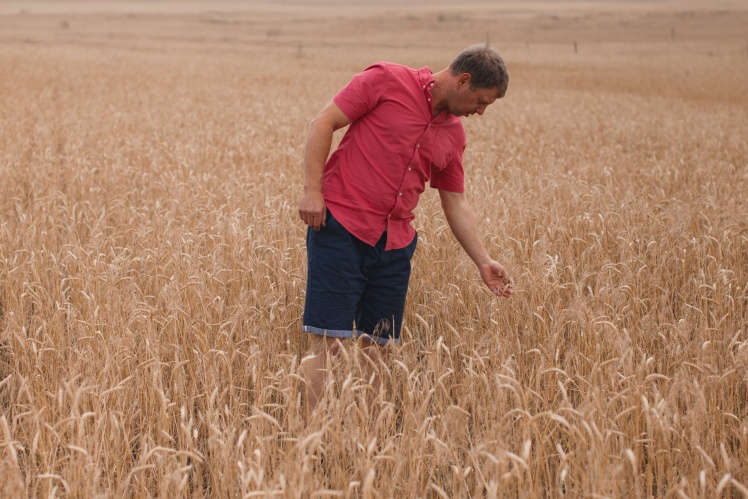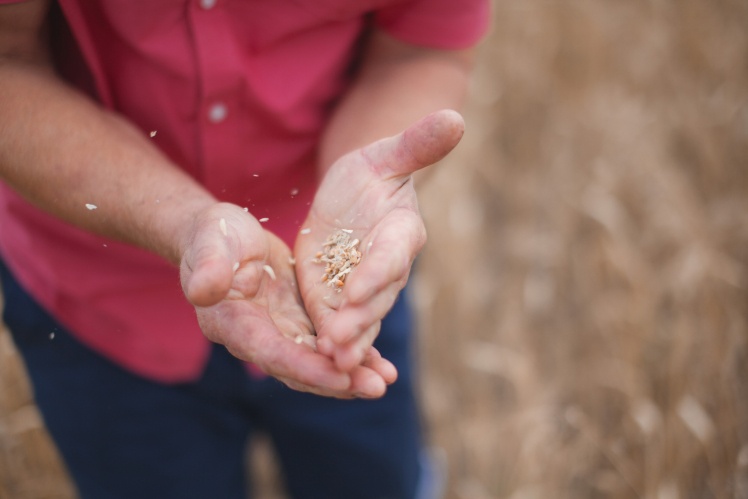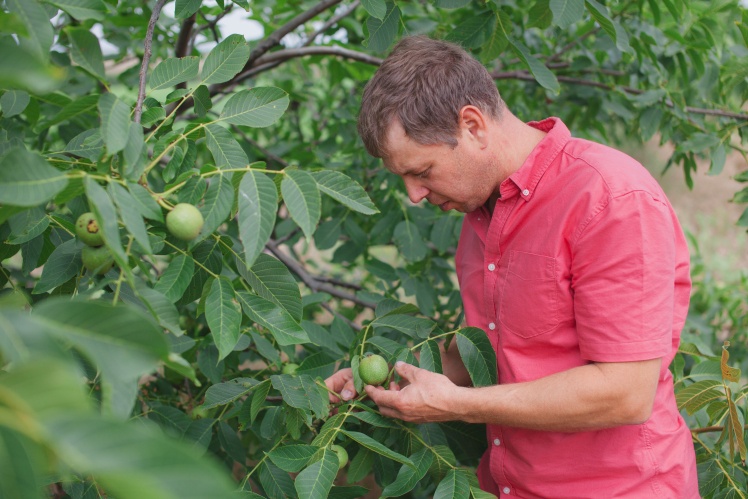1.
Oleksandr is 42 years old. He is the youngest of three brothers in the family of Ivan and Victoria Sherstyuk. Before the collapse of the USSR, the family lived in Kherson. Ivan worked at the factory, Victoria was an accountant there. When collective farms began to be dismantled in Ukraine, the Sherstyuks took 42 hectares of land and moved to Ingulets village to build their own farm. They got the land next to an abandoned stone quarry. The family cleared a small site of stones and built a house. Their fields on the slopes began twenty meters from the house.
“The land here is mediocre. If itʼs hot, everything dries. And as soon as the rain passes, the earth sticks together in such a way that it cannot be dug up with a spade,” says Oleksandr. “But we never had the opportunity to choose, we were happy for what we had.”
Sherstyuks kept cows, turkeys, pigs, and grew vegetables for sale. In 1995, Ivan founded the "Green Grove" (“Zelenyi Hai”, “Зелений гай”) farm, bought a field from his neighbors at an auction. The family farm grew to 100 hectares, which were sown with barley and wheat.
Oleksandr Farm.
Mykhailo Melnychenko / «Babel'»
"In the nineties, everyone wanted to eat, and the products were only from the village. Thatʼs how we earned money," says Oleksandr. “We planted five hectares of strawberries and two hectares of raspberries, each picking five tons per summer. There were apple orchards. Parents forced us to work — they instilled love, so to speak, for the land. And now itʼs hard to quit this business.”
Only Oleksandr became a farmer in the family. Ivan Sherstyuk helped the middle son open a construction business in Kherson, and the eldest son built a shop and bar in Ingulets. Twenty years ago, Oleksandr met his wife Alyona there. The young family settled on a farm — together with Oleksandrʼs parents. The other sons already had their families and lived separately. Now both of them are abroad — the eldest is in Italy, and the middle one is in Poland.
“My father had planned that his lifeʼs business would pass to me,” says Oleksandr. “I wanted this myself, but not that much. This work isnʼt appreciated in Ukraine. There are no earnings.”
Oleksandr has been engaged in farming all his life, despite the obstacles — like the last hero, he jokes. Sometimes the weather is bad and the harvest is not good, sometimes the price of grain is too low, because farmers have a lot of it.
“It isnʼt the state that accepts grain from farmers, but dealers. The state only reports how many tons were exported, as if it somehow helped it,” explains him. “The farmer is unprotected, because there are no guarantees that the wheat will be bought from him in the summer no cheaper than last year.”
The last years before the full-scale invasion of Russia were especially difficult for Oleksandr. Because of the COVID-caused quarantine, the markets and grocery stores where strawberries were accepted were closed, people were afraid to come and pick berries. The farmer lost an entire field.
“I had a hundred people picking strawberries a day, and to do it during quarantine is dangerous,” he recalls. “We first did it by only ourselves, and then we just mowed it down.”
Oleksandr has been working on a farm for more than thirty years. For him, every year is a struggle for the harvest.
Mykhailo Melnychenko / «Babel'»
Oleksandr dreamed of buying a harvester for three million hryvnias — he borrowed money from a bank. But now he says he drove himself into a debt pit. Every month he has to pay 20,000-30,000 hryvnias in interest on the loan. To pay off the debt, Oleksandr and his wife Alyona went to Poland to earn money.
“We told them that we have a farm, strawberry fields, nut orchards, wheat fields, and people were surprised: "How come you canʼt even make money to buy a combine harvester." But this is how it works,” says Alyona.
Oleksandr has been paying interest on the harvester for the past three years, and in the fall of 2021 he sold it because he did not have time to repay the loan on time. In the same autumn, he sowed the fields with wheat, barley and rapeseed — a total of 140 hectares. He says that no one had any idea that their village would be occupied on February 24. And if he had, then the peasant doesnʼt have that many choices: there is land, which means that it must be cultivated.
2.
Oleksandr and Alyona learned about the occupation when they heard explosions on the morning of February 24. They did not know what to do. The fields were sown, so they decided to stay. The father and mother were sent to the middle son, who moved to Poland way before the full-scale invasion.
In the first months, the village still had Ukrainian mobile communications. The family transmitted information about the movement of Russians to the chat rooms of the Ukrainian Armed Forces. Their house stands on a mountain, from where the road along which the occupiers walked is clearly visible. Alyona had binoculars at home, so she set up a "command post" for herself. The wife watched, and the husband wrote messages to the military.
Oleksandr points to the road along which the Russian tanks were moving. Alyona watched the occupying troops through binoculars and transmitted information to the Armed Forces of Ukraine.
Mykhailo Melnychenko / «Babel'»
“We donʼt know for sure, but we believe that thanks to us, one helicopter was shot down. Because they flew here, we wrote [to our guys] — and then the blast came!,” says Alyona.
When the Ukrainian mobile phone connection disappeared in the village and the Russian one appeared, the villagers no longer knew the news — there was complete silence.
“You walk around the village — and there is no one. You can shout "Hey!" — and echoes are heard. Everyone sat at home like mice,” recalls Alyona. “People took the wheels off their cars so that the Russians wouldnʼt take them away. But if the Russians had come with machine guns, the wheels would have been found quickly.”
At the beginning of summer, it was time to mow rapeseed, which Oleksandr sowed on 37 hectares. The farmer didnʼt have diesel fuel, so he went to look for gas stations. When he returned to the field, he saw Russian soldiers. They said to pay "tribute" — either in crops or in money. Oleksandr had no money, so he had to give away five tons of rapeseed from the harvested crop. Then he had to give the same amount from the barley harvest. The peasants moved the tribute to the Russians in a hangar that they had built in one of the abandoned factories near Ingulets. From there, the occupiers sent the harvest to the Crimea and sold it there.
“The neighbors sowed the fields in the fall, and if some of them left the place due to the occupation, the Russians forced other farmers who had harvesters to go out and mow their crops. If someone refused, they shot and scared them,” says Oleksandr. “The Russians took only new equipment and, thank God, didnʼt touch old tractors like mine and of my neighbors.”
A farmer sowed 10 hectares of corn for seed to plant 50 hectares with it next year. But Oleksandr got the grain too late, the plant does not grow well.
Mykhailo Melnychenko / «Babel'»
Oleksandr also sent his rape crop to the Crimea. It deteriorates quickly, so it was necessary to sell it urgently. In Crimea, people bought rapeseed from him for $180 per ton — in Ukraine at that time the price was $400.
The family decided to leave the barley harvest at home in the attic. On November 10, the village was finally liberated from the occupation. The very next day, the Ukrainian military came to Oleksandrʼs fields to see if they were mined. They looked for mines, but the farmer had already sown everything.
“They asked: "How come you were not afraid to sow, if the Russians could mine everything?” recalls Oleksandr. “We were afraid, of course, but we had no choice.”
3.
Oleksandrʼs harvest of 2023 is only wheat. He sowed it in the fall, during the occupation. Rapeseed was not sown, but 80 hectares of land were left fallow to rest.
“In autumn, I hesitated whether to sow wheat or not. Will we be liberated or not. I saw that everyone is sowing, so I decided to do it too,” says the farmer. “Wandering around the village without work is no business.”
While the man is telling his story of survival, Alyona jokingly tells him all the time: “We could be sitting in Italy at this time with our brother.” Oleksandr doesnʼt answer her at first, but then says: "We would be sitting there and eating the money. And here is home.” Alyona agrees with her husband that she would not be able to abandon her fields.
“Now living here is quite scary, but not as nervous as during the occupation. Itʼs scary, because the Russians pound the village every day. Do you hear the whistle?”, says the farmer, and a shell explodes somewhere very close by. “This is from us to them [the occupiers]. The Russians are firing chaotically, they donʼt know where ours stand. And ours respond to them, and so it goes without ceasing.”
After the de-occupation, shells flew into the familyʼs yard twelve times. Once, debris wounded Oleksandr in the leg. But that wasnʼt significant, he says. He healed the wound without doctors.
The family had little money for the year and a half of the full-scale war — they saved every hryvnia to collect the wheat harvest. Recently, the farmer learned that for his grain he will receive $160 per ton. But to bring the harvest to the elevator, he will hire a transport — and so he will lose $45 from each ton. At the elevator itself, part of the grain will be rejected. From the earned money, he will pay taxes, salary to the harvester, and the rent of the land. In addition to the 100 hectares of land that the family owns, they rent another 100 hectares from neighbors.
Oleksandr's harvest of 2023 is only wheat. He sowed 50 hectares during the occupation. He planned to mow 40 hundredweights per hectare, but the harvest failed, because during the occupation he could not protect the grain from pests the way it's needed.
Mykhailo Melnychenko / «Babel'»
“I hope my net income from wheat will be at least $80 a ton,” he says. “It will not be possible to collect a lot of grain. I planned to mow 40 centners per hectare, but now hopeful to get 20.”
Failure with the harvest befell Oleksandr, because before planting he treated the grain only once — from a fungus, and it was necessary to do it twice so that insects would not eat it. The second time the farmer didnʼt have the poison -- just could not find it in the occupation.
Oleksandr calls any insect that gnaws his fields a bug. They also live in walnut gardens — he has trees planted on 65 hectares. The varieties are French and very picky. Eight years ago, he planted them to export abroad. His garden bore fruit for the first time during the occupation — the family peeled the nut and sold it to the locals. This year, the harvest will be delivered in Ukraine, the farmer will not be able to send it abroad.
“All logistics are broken. Earlier, the nut was sent to ports in the Odesa region, and it was exported from there. Now everything goes by land, and the price for transportation will be higher than what I will be paid for the harvest,” says Oleksandr. He breaks open a still unripe nut with his hands and shows how the “bug” ate the core.
"Bug" ate part of the crop. Oleksandr's nut orchards.
Mykhailo Melnychenko / «Babel'»
“You see, they ate about thirty percent of my nuts,” he argues. “And we always have such a problem — sometimes heat, then COVID, then war, then a flood. Fortunately, we were not flooded when the hydroelectric power plant was blown up. Our neighbors lost their wheat.”
In the field, despite the shelling, the family works without body armor. It happened that they threw the tractor and ran away to the storage room. But neither Oleksandr nor his farmer neighbors even think about not harvesting — it is the only income for both the owner and those who have harvesters and go to work for hire.
“What we lack is not courage, but diesel fuel,” he says.
There is a problem with fuel in the village — it has become more expensive, and it is as difficult to find it as it was during the occupation. And Oleksandr needs diesel like water — he uses 160 liters per working day, refueling two tractors and two harvesters.
He says that if the state somehow helped him and private farmers like him, it would be much easier. For now, there is no fuel, no subsidies, and no one regulates grain buyers. They set a price that is beneficial to them — all the costs for the new logistics of grain export by land fell on the growers.
It isnʼt clear how to harvest in autumn, although Oleksandr is already preparing for sowing. In the de-occupied territories, there is humanitarian aid from the Food and Agricultural Organization of the United Nations — FAO. Oleksandr was given seven sacks of corn and ten sacks of sunflower seeds for planting next year. He also wants to plant canola — but heʼs not sure heʼll find the money to buy the seeds, plant and harvest the crop.
Other farmers in Ingulets are also confused. Now there are no more than a dozen of them. Oleksandr bends his fingers and enumerates: "One became an alcoholic, the second one too, the third got disappointed."
“Will I be disappointed? Well, I became a long time ago, but how can you give it up,” he says. “This is the land. You either love it or you donʼt. I do.”
Oleksandr and Alyona met as students and have been living together for over twenty years.
Translated from Ukrainian by Anton Semyzhenko.
So that Oleksandr calmly harvests his crop, support the Armed Forces of Ukraine.









